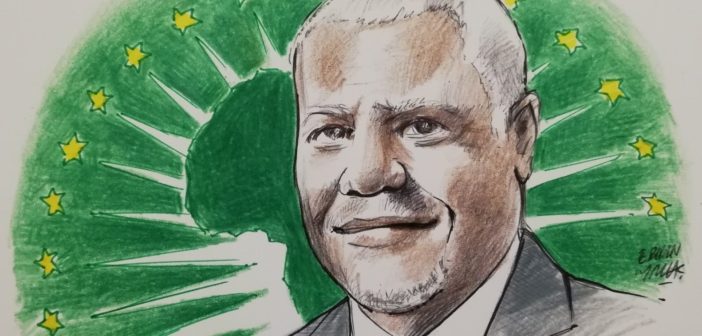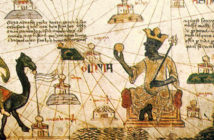Feb. 7, 2021, was an important day for the African Union (AU). Elections would be held for the fifth time for the chairmanship of the commission, which is the most important office in the union, on the 19th anniversary of its founding.
At a time when the world is haunted by the pandemic, the most influential person in terms of the future of the African continent would be determined.
The day that had been awaited actually arrived, and Moussa Faki Mahamat, who served as prime minister in the Republic of Chad for a short time and has been the foreign minister of the country for a long time, was nominated as the only candidate.
The greatest reference for him is that he has successfully accomplished his duties. He has taken an unprejudiced approach toward current developments and has paid attention to consensus and taken consultation seriously. He totally deserves an appreciation.
The AU is one of the largest union movements with 55 members after the United Nations. It came into operation in the years when colonialism continued in some parts of the continent, and it saw eight secretaries-general in this period.
Turkey is a key partner
Turkey announced 2005 as “The Year of Africa.” As the first chairperson of the African Union Commission (AUC), Alpha Oumar Konare visited Turkey for the first time in the 42-year history of the institution, turning over a new leaf in the Turkey-Africa relations.
He even invited President Recep Tayyip Erdoğan to speak at the eighth ordinary statesmen summit in January 2007. Given the fact that only the states on the continent are entitled to be members, Turkey was admitted as a non-member observer state to the AU and African Development Bank during his term of office.
His most important duty is that he made all the preparations for the first AU-Turkey statesmen summit.
However, as his term expired before August 2008, this meeting took place during the time of his successor Jean Ping.
In January 2017, Mahamat was elected the fourth chairperson of the AUC with the support of 36 states after a fierce competition.
Many unprecedented developments in the history of the AU took place under his chairmanship. In 2021, heads of states voted to elect their fifth chairperson at the 34th ordinary summit through videoconference for the first time.
Uganda’s argument that this would not be a reliable election and that it should be postponed was rejected.
Mahamat was the only candidate running in the election. This was a first in the AU’s history. When he became a candidate for the first time, he had strong opponents. A total of 51 out of the 55 member states voted for him, giving him unprecedented support.
Although it is mentioned along with member states, the Sahrawi Arab Democratic Republic did not vote in the election due to its current position. Only three countries abstained. The fact that he was elected with such great confidence is the result of the outstanding success he displayed during his first term.
Second success
Over the last two decades, Chad has remained an island of peace as it has been surrounded by ethnic conflict in Darfur and Sudan in the east, the political turmoil in the Central African Republic in the south, the Boko Haram terrorists in the west – which has turned the Lake Chad basin into a bloodbath – terrorist attacks in the Sahara and in the Sahel in the south and the Libyan civil war in the north.
People who escaped the internal tension in all the neighboring countries and emigrated to this country were placed in camps dedicated to them.
In addition to undertaking the outcomes of tensions in Africa, Chad has also been praised for intervening in the internal conflict in Mali as the most influential state in 2013.
In order to open up a sphere of influence for itself in Africa, France carried out Operation Epervie between 1986 and 2014 and is now carrying out Operation Barkhane in the Chadian capital of N’Djamena now.
Chad President Idriss Deby’s resolute stance was effective in the founding of a new security line with Niger, Burkina Faso, Mali and Mauritania, which is called the G5 Sahel.
Although all these efforts did not attract the attention of the international community enough, they enabled the country to go through developments that boosted its value in the eyes of African countries.
The Republic of Chad received the first fruits of the responsibility it assumed in these tensions in January 2017 when it nominated then Foreign Minister Mahamat as AUC chairperson, taking up the challenge.
At the last minute, he participated in the nomination process on behalf of the African group for the general-secretariat of the 57-member Organization of Islamic Cooperation (OIC), which convened in Niger in November 2020.
Hissein Brahim Taha, who became the foreign minister in Chad in 2017, was unanimously elected the secretary-general of this organization, which is effective in making important decisions related to the Islamic world on behalf of his country, and was the most competent representative office for the next four years.
Setting out with the slogan “Chad is my village, Africa is my homeland, we apply to the chairperson of the commission as an African citizen” and elected the AUC chairperson, Mahamat has a great chance to achieve Africa’s goals in the 21st century.
Undoubtedly, the experiences he has gained in his 60-year lifetime have a lot to do with this impression.
Indeed, when he was born on June 24, 1960, a large portion of his country – including the southern, middle and western parts – had been under the French occupation for about 60 years, and the north where he was born and raised had been under French occupation for 40 years.
When he was born, France had not yet ended its colonial presence in Chad. Fortunately, when he was only two months old, his country gained independence from France without personally experiencing the pains of that period.
Unfortunately, however, for 48 years of his life, he had to go through the civil war which his country was dragged into.
In the 1980s, he entered the law school in N’Djamena and continued to study in the Congolese capital of Brazzaville, where he spent a life of exile.
The repressive administration of Hissene Habre who ruled the country between 1982 and 1990 was overthrown by Deby Itno in 1990.
It was time for Mahamat to become influential in his country. Although he was very young, he held many important positions at the general directorate level in different ministries. He served as prime minister for nearly two years between 2003 and 2005 and as foreign minister for 10 years between 2008 and 2017.
Mahamat has a perfect command of the Arabic, English and French languages and is also familiar with the local languages in his country – which has carried him to the forefront among the growing number of statespersons who stand out with their intellectual identity in Africa in the 21st century.
The people of neighboring countries, and now all African societies, as well as the Chadians themselves, know and admire him. He will be admired due to his leading personality all over the world in the near future.
A statesperson of logic
Statespersons are considered to have the biggest role in creating negative perceptions of Africa. This issue is kept on the agenda so intensively that it has become a preconceived opinion about them.
When I took over as the first Turkish ambassador of the Republic of Chad in 2013, Mahamat was one of the first persons I became acquainted with. I was impressed by his solemn and patient diplomatic attitude, well-developed personality and many other great characteristics, all of which turned upside down bad perceptions of African leaders.
Chad nominated him for AUC chairperson, noticing that his services should go beyond his country as the entire continent needed him.
Silencing the guns
When the Sahrawi Arab Democratic Republic was admitted to the Organization of African Unity in 1984, Morocco protested this decision and withdrew from the organization.
Moroccan King Mohammed VI launched efforts to return to the union in 2016, and his country was admitted again in January 2017. This was before Mahamat had become the AUC chairperson.
In his four-year term of office that followed, Mahamat eased the 45-year tension in Africa and brought the state of affairs to a standard set by the U.S. thanks to his serenity and successful administration.
He endeavored not to allow the Kingdom of Morocco to go out of this effective environment with extremely disturbing moves once again and did not completely overlook this issue.
Mahamat appeased the tension between Algeria and Morocco, which was one of the most serious crises based on this.
As Christophe Boisbouvier, the Africa director of the French Radio France Internationale (RFI), stated, Mahamat stands at an equal distance to the relevant parties and aims to provide the desired benefit in solving the issue he is focused on.
All international organizations are supposed to implement ideas and plans about problems, instead of just addressing them in meetings.
From the moment Mahamat took office, he dealt with seemingly insoluble problems of Somalia, Central Africa and South Sudan not only on the table, but he personally investigated these problems on site.
In short, in all the existing crises, he has always strived to relieve the tension and to use Africa’s opportunities to establish peace.
The issue he focused on most between 2017 and 2021 was “silencing the guns.” Although the desired success has not yet been achieved, this will be the next priority issue for him.
He was guided by his own experiences as a person who personally experienced the 48-year Chadian civil war that has caused almost irrecoverable losses for the country.
Experience on administration
Turks have a famous maxim in their administration tradition: “The ignorant rule by cruelty and the knowing rule by knowledge.”
In this sense, Mahamat’s life is a success story. He had a broader horizon as a result of the fact that he overcame the challenges of the environment he lived in, and he challenged the impossibilities of Africa in the 1970s and thus studied law, which is a crucial area.
Moreover, his study entitled “Administrative Reforms and Development Administration in Congo and Chad” is indicative of this.
Oppressing and harming people has no room in his political thought and attitude. He always endeavors to embrace those who are in this situation.
His diplomatic success when 120,000 refugees arrived in Chad from Darfur in March 2013 is unforgettable.
As the burden of this migration persisted, he welcomed his cognates and refugees from Central Africa, as well as bringing back tens of thousands of Chadian nationals, who had been making a living in Libya, from the North African country after the subversion of the Moammar Gadhafi regime in Libya.
His patient and dignified attitude toward Nigerian migrants who survived Boko Haram’s atrocities has enabled him to have a say in the fate of the continent.
The development goal
In 2018, the Single African Air Transport Market (SAATM) was adopted with the participation of 34 countries which account for 80% of the African market.
The biggest issue for Africa in the 21st century is to make the necessary moves for development.
To this end, Africa needed to get rid of the CFA franc, which was the most serious drawback especially for the African continent free trade zone and Western and Central African countries, and to switch to the local currency called Eco.
Efforts on all this were completed in 2020 and they came into force in recent months.
During his first term, Mahamat did not have futile dreams or make promises that he could not fulfill.
However, he formed the basis of his dreams, which he considered implementing in his second term, if possible.
He has focused on serving the people and achieved this with serious planning instead of sudden maneuvers. He has set the primary leverage in building the continent for future generations as “art, culture and heritage.”
Almost all countries and organizations in the world say that women are not given enough opportunities in administration, but just a few of them deal with the issue.
At this point, the AUC is an exception. Monique Nsanzabaganwa, the vice-chairperson of the AUC under Mahamat, who was elected the chairperson for the second time, reduced the number of sub-commissions to six from eight, with three of them being led by female commissioners.
Bu yazı 3 Mart 2021 tarihinde DailySabah.com’da yayınlanmıştır.




